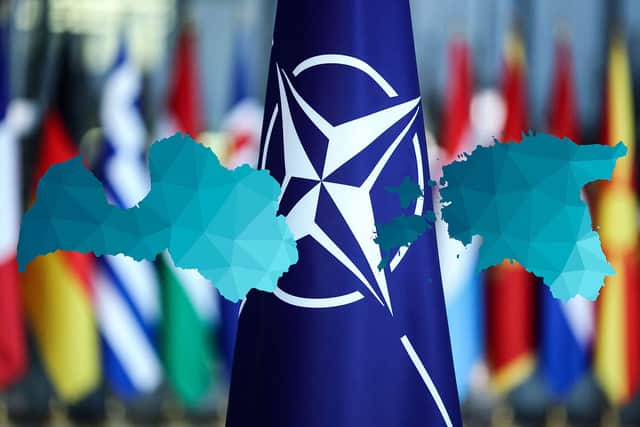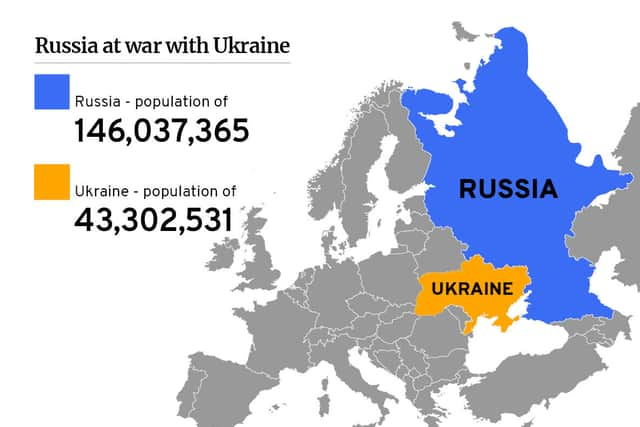What is Article 4? Why have Latvia and Estonia invoked article of NATO treaty amid Russia invasion of Ukraine
This article contains affiliate links. We may earn a small commission on items purchased through this article, but that does not affect our editorial judgement.
and live on Freeview channel 276
The prime minister of Latvia has called for a consultation among NATO member nations based on Article 4, according to a Twitter post from his official account.
This follows Russian president Vladimir Putin’s early morning TV address on Thursday 24 February where he confirmed a special military operation will be carried out, and demanded the Ukrainian military to lay down their arms.
Advertisement
Hide AdAdvertisement
Hide AdIn conjunction with Latvia, the prime minister of Estonia, Kaja Kallas, said: "The most effective response to Russia’s aggression is unity."
Article 4 urges NATO members to convene when any other member is concerned about its territorial integrity.


What is Article 4 of the NATO treaty?
Article 4 of NATO’s founding treaty says: "The Parties will consult together whenever, in the opinion of any of them, the territorial integrity, political independence or security of any of the Parties is threatened."
It essentially means that when a member is threatened by military action that could harm its territorial claims, the other members are required to consult one another.
Advertisement
Hide AdAdvertisement
Hide AdAs soon as the article is invoked, the issue is discussed and can potentially lead to some form of joint decision or action on behalf of the alliance.
Fellow members sitting around the council table are encouraged to react to a situation brought to their attention by a member country.
It comes as residents in Kyiv are fleeing the city following the confirmation of an invasion.
Other NATO countries have agreed to the call including Lithuania and Poland.
Advertisement
Hide AdAdvertisement
Hide AdWhy have Latvia and Estonia invoked Article 4?
On Wednesday, Russian president Vladimir Putin held a television address where he said he had "made the decision of a military operation".
He warned: "Nobody should feel any doubts that a direct attack on Russia would end with the potential aggressor’s defeat and terrible consequences for the attacker.”


Explosions were heard across Ukraine overnight, with its foreign minister warning a "full-scale invasion" was underway.
This week Putin recognised the independence of the People’s Republics of Donetsk and Luhansk - meaning Russia has officially given up on the 2015 peace deals that recognise Ukraine’s sovereignty over the territory.
Advertisement
Hide AdAdvertisement
Hide AdIt now also gives Russia a pretext to send troops to these areas.
When has Article 4 been invoked before?
Since the creation of NATO in 1949, Article 4 has been invoked six times.
Turkey has invoked the article four times: in 2003 over the Iraq War, in June 2012 after the shooting down of a Turkish military jet by Syria, in October 2012 after Syrian attacks on Turkey and their counterattacks, and in February 2020 as part of the Northwestern Syria offensive.
Latvia has invoked Article 4 over Ukrainian matters such as in 2014 in response to the Russian annexation of Crimea.
Advertisement
Hide AdAdvertisement
Hide AdIn November 2021 Poland, Lithuania, and Latvia all invoked Article 4 following tens of thousands of migrants entering into the EU from Belarus into Poland, Lithuania, and Latvia.
What have Estonia and Latvia officials said?
The Estonian Government said in a statement today: "Estonia’s support for Ukraine is steadfast. We stand firm for Ukraine’s independence, territorial integrity and sovereignty within its internationally recognised borders.
"Ukraine needs our political, economic and military support. We must offer strong support to Ukraine."
The Latvian Government also released a statement reading: "Russia’s aggression against Ukraine and the increasing presence of Russian armed forces in Belarus are bound to leave a long-lasting negative impact on the overall security situation in Europe.
Advertisement
Hide AdAdvertisement
Hide Ad"This calls for an appropriate NATO’s action towards the strengthening of security and defence on the eastern flank of the Alliance.”
It continued: "We, the President, the Speaker of the Saeima, the Prime Minister, and the Minister of Foreign Affairs of Latvia, on behalf of the people of Latvia, stand in solidarity with the Ukrainian people and offer our unwavering support for Ukraine’s freedom, sovereignty and territorial integrity."
A message from the editor:
Thank you for reading. NationalWorld is a new national news brand, produced by a team of journalists, editors, video producers and designers who live and work across the UK. Find out more about who’s who in the team, and our editorial values. We want to start a community among our readers, so please follow us on Facebook, Twitter and Instagram, and keep the conversation going. You can also sign up to our email newsletters and get a curated selection of our best reads to your inbox every day.
Comment Guidelines
National World encourages reader discussion on our stories. User feedback, insights and back-and-forth exchanges add a rich layer of context to reporting. Please review our Community Guidelines before commenting.
